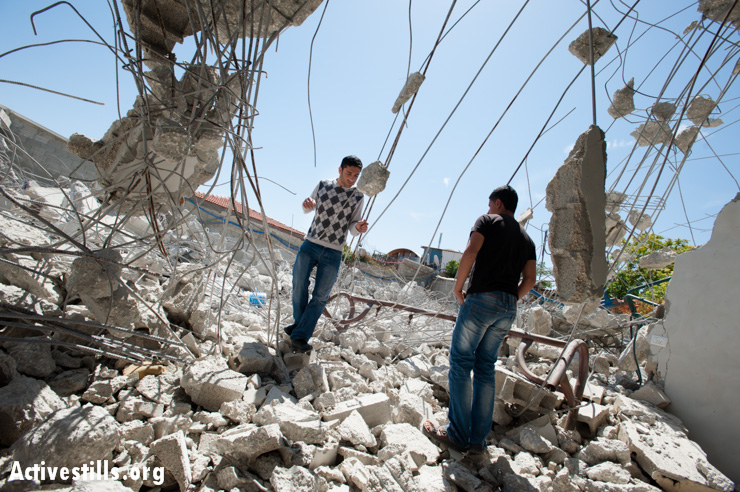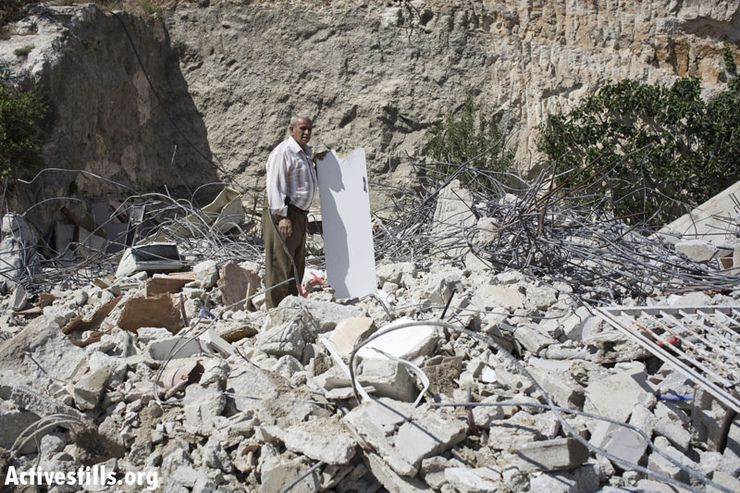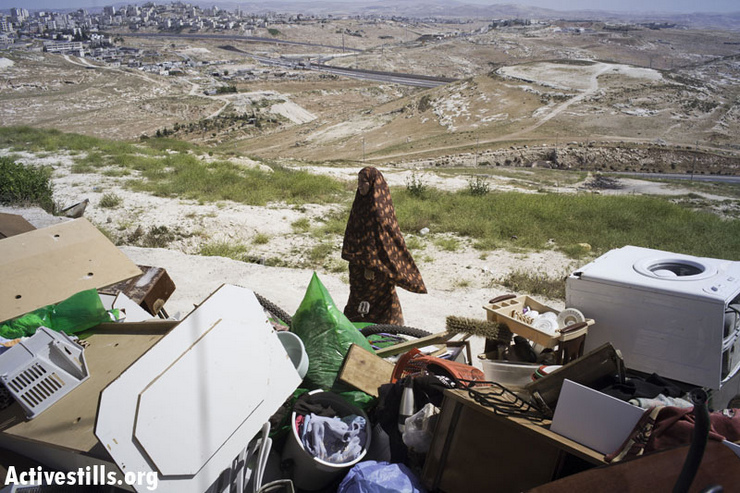Demolitions of Palestinian homes in East Jerusalem are part and parcel of Israel’s publicly stated plans to reduce and control the demography of Palestinians and non-Jews in Jerusalem. With little chance of receiving building permits, Palestinian families often decide to build anyway, hoping that maybe their home will be spared.

On Wednesday April 24, Israeli authorities demolished three Palestinian houses in the At Tur neighborhood on the Mount of Olives in East Jerusalem. The pretext, as usual, was that the owner had built illegally, though he had spent months applying for permits from the Jerusalem Municipality and provided all requested documentation. One of the structures demolished was an addition built to house the youngest generations of the 45-member Jaradat extended family, illustrating one of the basic quandaries facing East Jerusalem Palestinians: As families grow and children get married to start families of their own, where can they live if the government will not grant them permission to build?

Israelis sometimes display a disturbingly blasé attitude toward the demolition of Palestinian homes. One sometimes encounters the attitude, even among self-proclaimed leftists, that “there are laws,” and since an Israeli Jew cannot build a house without permission, why should a Palestinian be able to? They might even offer examples of how their own family wanted to build and were denied permission. So if Israelis obey the law, isn’t it the Palestinians’ fault when they are punished for breaking it?

This attitude may seem reasonable to foreigners as well. Most countries have zoning and building regulations that are generally respected as a necessity for maintaining orderly communities. But what these attitudes fail to grasp is the systematic discrimination faced by Palestinians under Israeli occupation, a context well-documented by various human rights organizations. It is no accident that the average Israeli seeking housing or permission to build simply has far more options and opportunities than the average Palestinian.

A report issued by the Israeli Committee Against House Demolitions (ICAHD) summarizes this discriminatory context, emphasis added:
Under Israeli zoning policy, Palestinians can build in just 13 percent of East Jerusalem and in just 1 percent of Area C. In both cases these areas are already heavily built up. More than 94 percent of all Palestinian permit applications have been rejected in recent years. This means that when a family expands or a community wants to build infrastructure to meet its basic needs, the choice faced is between building without a permit and not building at all. Many end up building to meet their immediate needs in the hope that they will be able to avoid demolition. Unfortunately, the number of people affected by demolition continues to steadily grow.

In another ICAHD report, human rights lawyers Emily Schaeffer and Michael Sfard plumb the depths of Israel’s discriminatory demolition rationale:
[A]dministrative home demolitions in East Jerusalem are directly connected to planning, zoning and building policies in the city. Thus, it is of extraordinary significance that this policy of preference based on ethnic background – often referred to as “Judaization” – has been an alleged motivation behind policymaking regarding planning, zoning and building in Jerusalem. Interestingly, this motivation is not concealed but rather openly discussed by Jerusalem Municipality officials. (continued)

In 1977, then Director of the Planning Policy Section of the Jerusalem Municipality, Israel Kimhi, stated that: “A cornerstone in the planning of Jerusalem is the demographic question. … That decision, concerning the city’s rate of growth, serves today as one of the criteria for the success of the process of Jerusalem’s consolidation as the capital of Israel.” (continued)

Former Jerusalem Mayor Teddy Kollek’s advisor on Arab affairs, Amir Cheshin, wrote in his well-known book, Separate and Unequal: “The planning and building laws in East Jerusalem rest on a policy that calls for placing obstacles in the way of planning in the Arab sector – this is done in order to preserve the demographic balance between Jews and Arabs in the city, which is presently in a ratio of 72 percent Jews versus 28 percent non-Jews.” (Continued)

The current city master plan, “Jerusalem 2000,” the first comprehensive plan covering West and East Jerusalem, first approved in 2007 by the Jerusalem Local Planning Committee, stresses the importance of maintaining a demographic balance such that there is an overwhelming Jewish majority. …
In other words, rather than addressing the needs and welfare of its residents, the Jerusalem Municipality is focused on maintaining and expanding the presence of one group while driving the other out.

Israel’s settlement policy exposes further evidence of discrimination. All Israeli settlements in the occupied Palestinian territories are illegal under international law, specifically, the Fourth Geneva Convention. However, settlements built without even Israeli government permission are rarely demolished or evacuated apart from a few high profile fig leaf cases which are typically offset by accelerated building elsewhere.

According to the Israeli human rights organization B’Tselem:
Israel has created a situation in which thousands of Palestinians are unable to obtain permits to build on their land, and are compelled to build without a permit because they have no other way to provide shelter for their families. … At the same time, at least 155 Israeli settlements, containing more than 170,000 Jewish Israeli citizens, have been established. These settlements benefit from an efficient system of planning and supervision of construction, and establishment of comprehensive planning schemes for all the settlements. Despite this, thousands of houses were built in these settlements without permits. Israel refrained from demolishing these houses, and instead issued retroactive building permits for thousands of houses constructed without permits. This building-permit policy blatantly discriminates between settlers and Palestinians.

There have been at least 24,000 documented demolitions of Palestinian homes in the past 45 years of Israeli occupation (out of which 2,000 were in East Jerusalem). There are currently around 1,500 standing demolition orders in East Jerusalem, each order representing a family living in fear, that, like the Jaradat family last week or the Ghaith family just yesterday, they will awake one morning to the sound of Israeli bulldozers with only moments to flee their home before it is destroyed. Given this well-documented reality, people of conscience, whether Israeli or international, have no excuse for apathy toward the destruction of Palestinian homes.

